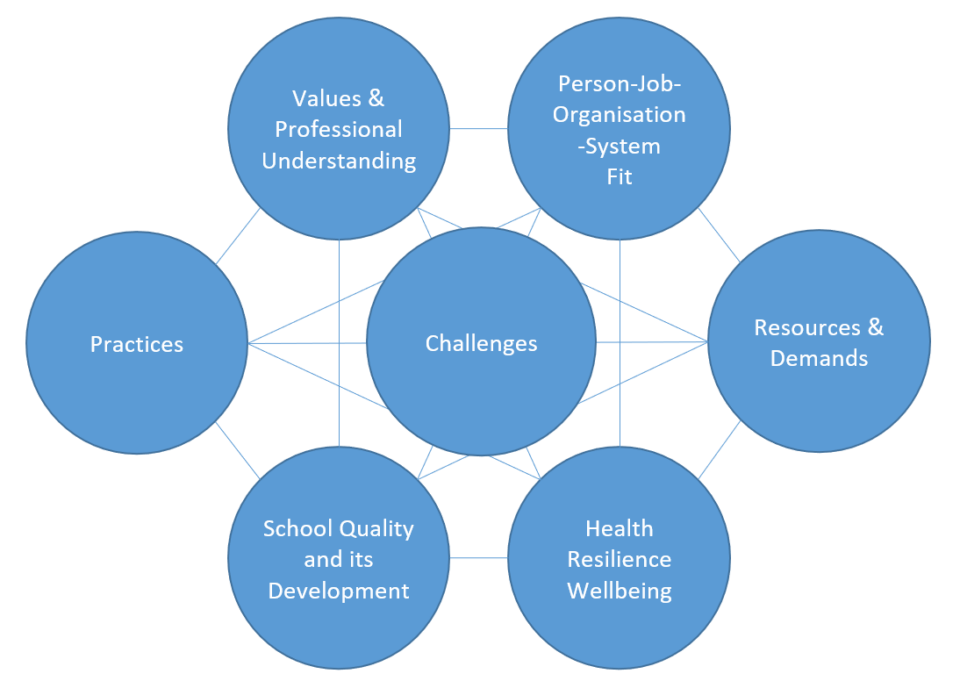WSLS: World School Leadership Study

Short description
In a rapidly changing society, education and schools are faced with diverse challenges. Over the past decades, the New Public Management and local management of schools seem to have shaped educational policies, school reform, and school improvement in many countries. School leadership for ensuring and developing the quality of schooling has become more crucial and complex than ever before. As a result, school leaders’ practices and their work effectiveness and efficiency have become a major concern for policy makers and educational authorities. Their health, resilience and well-being have become a major concern for school leader associations.
Despite a large number of studies underpinning the importance of school leadership for school effectiveness and improvement (e.g. P. Hallinger & Heck, 2010; Hallinger & Huber, 2012; Huber & Muijs, 2010; May, Goldring, &. Huff, 2009; Robinson, Lloyd, & Rowe, 2008), so far very few studies have examined school leaders’ functions, practices, work conditions and their impact on school quality development as well as on their own health and resilience. Contingency approaches, being aware of context on various levels and different areas, are small in number, even if many research findings can be very well explained by various kinds of fit, in particular person-environment fit. Moreover, there is a lack of international comparative studies that systematically examine these topics and their interdependency on a global scale.
This planned study was already presented at the European Conference on Educational Research (ECER) of the European Educational Research Association EERA (2016, 2017, 2018) with Jim Spillane as discussant, World Educational Research Association in conjunction with the American Educational Research Association AERA Annual Meeting (2017) with Vivianne Robinson as discussant, the Asia Leadership Roundtabel ALR (2017, 2019), and the World Education Leadership Symposium WELS (2017, 2019).
Aim
The purpose of the World School Leadership Study (WSLS) project is to research and monitor the profession of school leadership nationally and internationally.
The study had an interruption due to COVID-19 and is now being continued. Among other things, it offers insights into education systems, the role of school leadership, the state of research on school leadership, and the impact of the COVID-19 pandemic on school leadership-all based on country reports from different continents.
The study also provides information for educational policy makers and school administrators as part of Responsible Science.


The data will be analysed and reported nationally with an ideographical perspective and internationally with a comparative perspective. Two levels of research questions guide the research.
Level 1 Research area-specific questions:
- Resources & demands: What kinds of resources and demands are available on personal, organisational and system level that support or restrain school leaders’ practice? How are these resources and demands experienced by the school leaders? How is the balance between resources and demands?
- Health, resilience, well-being: What are the school leaders’ perceptions on their own health? How resilient are school leaders? How is school leaders’ work-related well-being?
- Values & professional understanding: How are different professional values and professional understandings deemed important to school leaders, organisation and system? How do they align or misalign with each other?
- Practice: What practices do school leaders prefer? What practices do school leaders experience as strain? How do school leaders spend their time at work?
- Person-job-organisation-system fit: How do school leaders fit to their job, organisation and system? How is the balance between different fits?
- School quality and its development: How do school leaders perceive school quality and its development?
- Challenges of school and school leaders: Which are the greatest challenges for school leaders and how do they affect their work and health?
Level 2 Cross research area questions (some examples):
- What are school leaders’ cognitive appraisal of the resources and demands on personal, organisational and system level?
- How do the demands and resources impact on school leaders’ practices, health, resilience, well-being and their efforts to develop school quality?
- How is the person-job-organisation-system fit related to school leaders’ practice, to health, resilience and well-being, as well as to the school quality and its development?
- How do school leaders’ professional values and understanding correspond to the demands and resources on the three levels?
- How are school leaders’ professional values and professional understanding related to school quality and its development?
- How do school leaders’ health, resilience and well-being transform into resource, affect their practice and affect school quality and development?
- How can the findings be compared in a cluster of countries or internationally? (Possible perspectives for comparison: high stakes versus low stakes systems, centralized versus decentralized systems, autonomy of schools, market orientation versus public system perspective, key values)

Design and methodology
The data will be collected using a mixed-methods approach. The International common design of the study comprises a country report (document analysis and expert interviews) and an online survey. The optional part of the study includes further focus in-depth studies, the end-of-day log and interviews or case studies.
The WSLS is conducted by an international research consortium that includes international scholars in the field of educational management and leadership and experts in areas such as health and specific research methodology and analytical techniques who will work collaboratively to conduct the study, disseminate findings and draw attention to implications for practice. In this way, the consortium as a whole covers a range of areas within social science and can be characterised as interdisciplinary. The work related to the international research collaboration, data collection, data handling and international comparative data analyses is coordinated by Prof. Dr. Stephan Huber, Chair of Excellence Leadership, Quality Management and Innovation, Department of Educational Research, Linz School of Education, Johannes Kepler University Linz (Huber-Office@Bildungsmanagement.net), Head of Leadership und Innovation, University of Teacher Education Schwyz. Country partners are responsible for funding the national research conducted in their own countries.

Impact of expected Results
It is expected that the results of the study will have an impact on different levels:
- the results will shed light on how different resources and demands at the system, organizational and personal levels affect the health related stress and well-being of school leaders as well as school quality and its development.
- based on the national data collected, it will be possible to make international comparisons so that similarities and differences between countries can be identified.
- the World School Leadership Study aims to provide evidence-based recommendations to inform policymakers, guide them in their decisions about the recruitment, training, and professional development of school leaders, and improve working conditions for school leaders in different countries.
.
WSLS as an International Research Network (IRN) of the World Education Research Association (WERA)
The WSLS is an established International Research Network (IRN) of the World Education Research Association (WERA). The IRN of WERA is the vehicle to the World School Leadership Study (WSLS).
An IRN provides a unique opportunity to share experiences across different members of the network. This particular IRN will go a step further in form of intensive collaboration in a joint international research project. By doing this it contributes to the spread and outreach as well as to the quality of the project, the WSLS study.
Furthermore, making the network internationally visible may also help to include colleagues from countries with which contact is not yet established.
This supports the notion of an inclusive approach with the aim of including countries where presently no national research body is established and where there is interest in getting experiences in terms of content regarding school-leadership and methods used in international surveys allowing comparison across different topics.
Finally, the IRN helps to disseminate findings and to contribute to the legitimacy and credibility.
A special interest is to promote young researchers. For this, we got a grant from the Asia Europe Foundation (ASEF) as well as from the European Education Research Association.
Ideally speaking each national research consortium has one young researcher who uses WSLS for his/her qualification. For those, special workshops will be organized either thematic or research methodology oriented. The International Research Consortium will support young researchers in their qualification and beyond. See also https://weraonline.org/international-research-networks-irns/#world-school-leadership-study-wsls-research-and-monitoring-of-school-leaders-profession
.
Leader of the WERA-IRN
Stephan Gerhard Huber Affiliation: Department of Educational Research, Linz School of Education, Johannes Kepler University Linz, Austria
E-Mail address: Huber-Office@Bildungsmanagement.net
.
Co-Leaders of the WERA-IRN
Continent coordination:
Europe:
Joanna Madalinska-Michalak Affiliation: University of Warsaw, Poland Address: Warsaw, Mazowieckie, Poland
E-Mail address: j.madalinska@uw.edu.pl
Helene Ärlestig
Affiliation: Professor in educational leadership at Centre for Principal Development, Department of Political science, Umeå University, Sweden.
E-Mail address: Helene.arlestig@umu.se
Web: http://www.pol.umu.se/cpd/personal/helene-arlestig
America:
Michael Johanek
Affiliation: University of Pennsylvania Address: Stieteler Hall, Rm 235
E-Mail address: : johanek@upenn.edu
Paulo Volante Beach
Affiliation: Facultad de Educacion UC Web; liderazgoescolar.uc.cl
E-Mail address: plvolante@gmail.com
Asia
Karanam Pushpanadham
Affiliation: University of Baroda, Vadodara, Gujarat, India Address:
E-Mail address: pushpanadham@gmail.com
Haiyan Qian
Affiliation: The Education University of Hong Kong, Hong Kong Address:
E-Mail address: hqian@eduhk.hk
David Gurr
Affiliation: University of Melbrourne Address:
E-Mail address: d.gurr@unimelb.edu.au
Africa
Lucy A. Wakiaga
Affiliation: Tangaza University College , Kenya Address:
E-Mail address: lucy.gombe9@gmail.com
Advisory Board
Ellen Goldring (CV)
Affiliation: Vanderbilt, Peabody College
Address: Payne Hall 205B, 230 Appleton PI#5721, Nashville, TN 37203, USA
E-Mail address: ellen.goldring@Vanderbilt.
Philipp Hallinger (CV)
Affiliation: College of Management, Mahidol University
Address: 69 Vibhavadi Rangsit Rd. Phaya Tahi, Bangkok 10400, Thailand E-Mail address: hallinger@gmail.com
Olof Johansson (CV)
Affiliation: formal employments: Political Science (Filosofie doktorsexamen) at Umeå University Address:
E-Mail address: Olof.Johansson@pol.umu.se
Jim Spillane (CV)
Affiliation: Northwestern University
Address : Room 208, 2120 Campus Drive, Evanston, IL 60208-0001, USA
E-Mail address: j-spillane@northwestern.edu
Allan Walker
Affiliation: The Education University of Hongkong
E-Mail address: adwalker@ied.edu.hk

Country Reports
Here you may find soon reports on school leadership research from different countries:
WSLS-Country-Reports